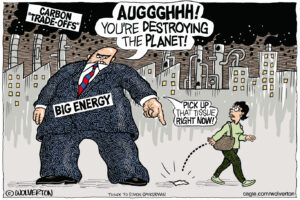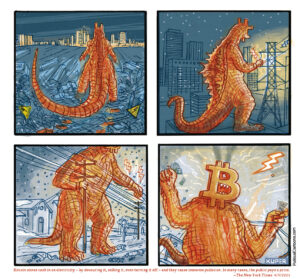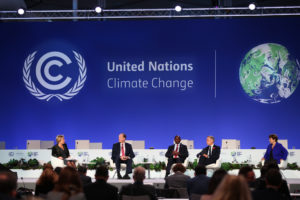Breaking Americans’ Addiction to ‘Meth’ (Methane Gas, That Is)
Official proposals to address climate change ignore the deadly math of methane gas. On July 24, thousands of people will march to change that, and some will call for an “ecosocialist” emergency response. A protest against the fossil fuel industry. (John Duffy / CC-BY-2.0)
A protest against the fossil fuel industry. (John Duffy / CC-BY-2.0)
By Stanley Heller
A protest against the fossil fuel industry. (John Duffy / CC-BY-2.0)
On June 12, I listened to Dr. Robert Howarth tell a meeting of 350CT, a Connecticut-based group promoting grass-roots environmental organization, about a briefing he had given last month to the White House Office of Science and Technology Policy. Howarth is professor of ecology and environmental biology at Cornell University and an associate of former top NASA climate scientist James Hansen. In 2011 he was in the running for Time magazine’s “Person of the Year.” His message this summer is that we know what to do to solve our climate worries, but we’re on the wrong path and have only a very short time to change direction.
The COP21 climate meeting in Paris last December finally recognized what ought to be the absolute limit for global warming: no more than 1.5 degrees Celsius. Beyond that point, we would initiate feedback loops that drive things totally out of control. An example would be a major spike in global temperatures following the melting of the Arctic permafrost.
The politicians talk about the year 2100 and 2050, but we don’t have that long to fix things. Howarth said his best estimates suggest the world will pass the 1.5-degree mark in 13 years and the two-degree mark in 28 years.
The problem therefore is in the short run. To avoid feedback loops, we need to urgently reduce greenhouse gas emissions. Unfortunately, we seem to be going in the wrong direction. The Obama administration has been happily pushing fracked natural gas as a “bridge” fuel to the time many decades in the future when we will go 100 percent renewable. Howarth explains that this won’t work because natural gas is a much worse greenhouse gas in the critical short run than carbon dioxide is.
Natural gas is almost entirely methane, and Howarth has calculated that the global warming effects of methane over a 20-year period are 105 times that of carbon dioxide.
There’s another problem. In the U.S., we now get a majority of our natural gas by fracking shale rock. Howarth said that getting the gas this way leaks three times as much methane into the air as do traditional extraction methods. In his 2014 State of the Union speech President Obama boasted about how much the U.S. had cut back on carbon dioxide emissions during his presidency. (Some of that was because of the Great Recession.)
Howarth agrees that carbon dioxide emissions have not been rising for the last five years, but that misses the point. Because of fracking, total U.S. greenhouse gas emission since 2008 has risen at the most rapid rate ever, Howarth said. Our “meth” habit — our growing addiction to methane gas — is keeping us on the road to climate catastrophe.
Howarth said part of the problem is that the Environmental Protection Agency is misinforming us. It’s vastly underestimating the greenhouse effects of methane partly because it uses defective equipment to measure it and partly because it talks about effects over 100 years when it should be focusing on a period of 20 years. A report by Harvard climate scientists released this past winter said that though the EPA had been saying human-caused methane emissions have not increased recently, years of satellite data show otherwise. They “suggest that U.S. methane emissions have increased by more than 30% over the 2002–2014 period.”
Now, here’s the good news. Cutbacks in carbon dioxide output are absolutely necessary, but we won’t see the effects for a very long time. Cutbacks on methane (and “black carbon” soot from burning), however, can reduce the effects of global warming in the coming decades. The fight against fracking is thus the fight against global warming.
The world needs to go fossil-free by 2050, and the U.S. must lead the way by going fossil-free by 2035. One means of achieving this, Howarth said, is by imposing a tax on methane emissions that would be 105 times the cost of a tax on CO2 emissions. But the fossil fuel industry would probably spend years or decades tying the effort up in court, as they’re doing with Obama’s modest EPA coal regulations.
I propose an ecosocialist solution: Declare a state of emergency, nationalize the energy industry and go on a crash “Manhattan project” program to completely change energy/heating/transportation. Howarth didn’t call for that, but he did point out that there have been massive changes in energy use in this country in a matter of decades, pointing to a transformation from transportation by horse to automobiles in just 40 years.
A complete ban on fracking would get the ball rolling. On July 24, thousands of people will gather on the streets of Philadelphia to demand an end to fracking. It’s billed as a “March for a Clean Energy Revolution.” The website is cleanenergymarch.org. It’s the day before the Democratic Party Convention and there will be tons of media in the city. The next day, an event called “Socialist Convergence” will examine the proposal of “ecosocialism.”
We don’t have time for the conventional proposals. We don’t have decades to wait while politicians make the usual crummy deals. We are balanced over a chasm, and the tipping points are almost upon us. Drastic changes are necessary, and tens of thousands of us have to get into the streets and start demanding it.
#BanFracking
#KeepItInTheGround
Stanley Heller is Administrator of Promoting Enduring Peace and host of the TV program “The Struggle.”
Your support matters…Independent journalism is under threat and overshadowed by heavily funded mainstream media.
You can help level the playing field. Become a member.
Your tax-deductible contribution keeps us digging beneath the headlines to give you thought-provoking, investigative reporting and analysis that unearths what's really happening- without compromise.
Give today to support our courageous, independent journalists.






You need to be a supporter to comment.
There are currently no responses to this article.
Be the first to respond.